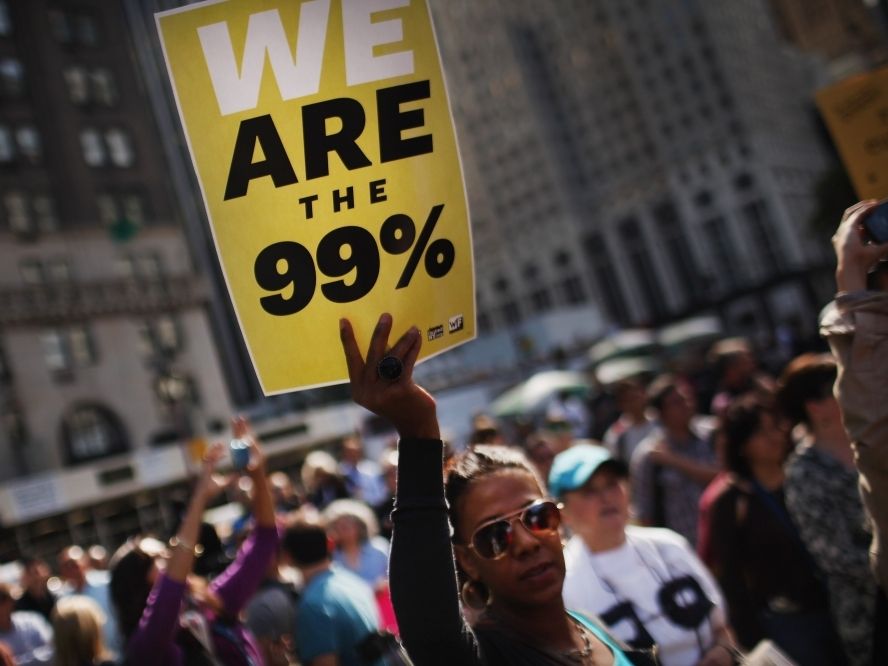
I shall be
The failure of the socialist revolution in the twentieth century and the emergence of bureaucratic capitalism
Text/Fries Fries
(Other contributor: Eisenstein)
Foreword: The Cause and the End of the Revolution
From the end of the nineteenth century to the beginning of the twentieth century, left-wing thought has become a "force" on the European continent, as Marx wrote in the Communist Manifesto:
"Which opposition party is not called the Communist Party by its enemies in power? And which opposition party is not accused of communism in retaliation to more progressive opposition parties and its own reactionary enemies?"
Not only in Europe, but all over the world, large and small labor movements have broken out. Revolutions, strikes, and riots have made the bourgeoisie embarrassed and have to use forceful means to suppress the resistance of the proletariat again and again, but it also often requires repeated "grievances" to keep the power of the bourgeoisie. In the era of material poverty, the people at the bottom lacked the necessary resources for survival, so the relationship between the proletarians and the bourgeoisie was very tense. This intense class contradiction brought the Marxist trend of thought to its peak, and revolutionaries and revolutionary organizations emerged. The whole world started "revolutionary with vigour and vigour", and the situation excited the left because it seemed that a new era of the proletariat was really coming. However, at the end of the 20th century and the beginning of the 21st century, with the disintegration of the Soviet Union and the new bourgeoisie created by China's reform and opening up, the socialist revolution of the 20th century was completely declared dead.
Does the death of the socialist revolution of the twentieth century mean the failure of the socialist political system? Does it mean that Marxism has failed? In this article, I will answer these questions by discussing the reasons for the failure of socialist revolutions in the twentieth century.
The Dictatorship of the Bourgeoisie and the Dictatorship of the Proletariat
All those in power are responsible for the source of the power they hold, and in a centralized government that revolves around the "central", the reason why local bureaucrats are not accountable to the local people is that their power does not come from They originate from the local people, but come from the central centralized government, so all their actions and policies only need to be responsible for the central centralized government. Only in a country with a democratic system, bureaucrats or representatives are responsible for the local people, because their power comes from the local people, not the center. In the capitalist "democratic" system of the West, presidents, governors, legislators, and other local officials, and even school board members, are elected by the number of votes cast by voters. It seems that under the Western "democratic" system, the power of the bureaucracy or representatives has been derived from the people, but its actual operation method is not so.

In any election process, political propaganda is an important part. Media reports, advertisements, debates and speeches directly affect the outcome of the election. In a capitalist system, the media, like any other business, is privately owned, and its news coverage and political commentary are based on positions dominated by a very small number of major shareholders in the business. Simply put, The position of the media is that of the bourgeoisie who owns the media. In addition to news coverage and political commentary in the media, campaigns such as political advertising require political contributions to sustain these campaigns. The source of political donations is related to individual donations and corporate donations, and corporate donations are the most critical source of funds, if not the largest. To sum up, when the bourgeoisie has a complete monopoly on social media, public opinion and resources, the source of power for bureaucrats and representatives is not from the people at the bottom, but from the most influential and wealthy bourgeoisie. The one in the hands of the people is the strength of media public opinion and the amount of political donations, and the final votes obtained in the election are nothing but the product of the results of the bourgeoisie's intra-class voting.

Women supported feminist policies for their rights, discriminated blacks supported racial equality policies for their rights, slaves fought for freedom. People will always fight for things related to their rights, and this principle is no exception from a class perspective. The proletariat refers to the low-level laborers who have no means of production and are forced to sell their labor power, while the bourgeoisie refers to the upper-class vested interests who have the means of production and can occupy the surplus value for free. Production is the activity that the proletariat depends on for a living, and the regular salary received from the enterprise is the only guarantee for the proletarian's life. Therefore, the class status of the proletariat cannot be separated from the production activity. Once he is separated from the production activity, he will no longer be. proletarian. Production activities consist of production environments and production relations. In the indirect democracy of the West, bureaucrats and representatives exist as full-time jobs. Political activities are different from production activities. They do not produce any services or goods. Therefore, bureaucrats and representatives are separated from any form of production activities. , they could not appreciate the hard production environment of workers and peasants and the exploitative exploitation they suffered. Bureaucrats and representatives who are separated from production activities will not speak for workers who have nothing to do with them, but only for their own class interests.

Democracy, if taken literally, means popular sovereignty, which means the rule of the will formed by the absolute majority of the people, but in combination with the above, in capitalism, whether it is an American-style two-party system or a European-style multi-party system , are not truly universal and fair democracy, because it cannot provide a fair right to participate in politics. Capitalist democracy is not the common rule of all people, but the internal democracy of the bourgeoisie as a very small minority in society, and its essence is an oligarchy ruled by a few aristocrats. This is the case with the so-called Dictatorship of the Bourgeoisie, where "dictatorship" refers to the monopoly of power of one class over another.
"Lenin said: The bourgeois state is an instrument of repression of the working class, the socialist state is an instrument of repression of the bourgeoisie. It is to a certain extent nothing more than a bourgeois state turned upside down. This simplistic view ignores the fact that The most essential thing: the class rule of the bourgeoisie does not require political training and education of the entire mass of the people, in any case no more than a certain limited degree. For the dictatorship of the proletariat, such training and education are the elements of survival , is the air without which the dictatorship of the proletariat cannot exist. " - Rosa Luxemburg, On the Russian Revolution
In a sense, the Dictatorship of the Proletariat can indeed be said to be the inversion of the dictatorship of the bourgeoisie, but this simple inversion ignores the fundamental difference between the proletariat and the bourgeoisie. The proletariat exists as an absolute majority in society, while the bourgeoisie exists as an absolute minority in society. If in the dictatorship of the bourgeoisie, all the bourgeois have the right to participate in political life, then in the dictatorship of the proletariat, all the proletarians have the right to participate in political life, and the operation form to realize this power is democracy.

The vanguard party established by "professional revolutionaries" as the leader of the post-revolutionary socialist regime contradicted the principle of the dictatorship of the proletariat. No matter which class these revolutionaries came from or how lofty socialist ideals they once had, when they are separated from production activities and the living environment of the proletariat, they will no longer represent the interests of the proletariat, but represent this the interests of the newly formed bureaucratic bourgeoisie. The dictatorship of the proletariat is run by the absolute majority of society, not by a few revolutionaries who are divorced from productive activities. The socialist countries that follow Leninism, such as China and the Soviet Union, eventually all ended in revisionism or division. History has already sentenced the vanguard theory to death.
State Capitalism and Public Ownership of the Means of Production
I quoted a summary of Marxism in the History of World Philosophy by Hans Joachim Schdurich in my earlier article "The Relationship between Democratic Socialism and Anarchism", Here I would like to re-quote in this article:
"Marxists do not realize that the public ownership of the means of production, the confiscation of all private property and making it 'social' common property, results in nationalization, which means that bureaucrats will replace managers in manipulating the state's economy. The complex modern national economy will inevitably require a huge bureaucracy, and workers will feel more helpless in the face of such a huge institution than if they face a single "capitalist". "
I don't agree that the author's understanding of Marxism here has been substituted into the overall Marxists. There are quite a few Marxists who are against the confusion of state ownership and public ownership. However, the author's summary of state ownership here is accurate. The so-called state capitalism is the transfer of production means from the capitalists to the state or the bureaucracy, and unlike the capitalists, the state is the monopoly of violence, which means The proletarians have less of a voice in the state capitalist system, and their fate depends entirely on the "enthusiasm of idealism" of the bureaucratic bourgeoisie possessing the means of production. Such a system is unreliable for the proletarians, who face the risk of the birth of a new capitalism at any time.

Private ownership of the means of production is the ownership of the means of production by the bourgeoisie, while public ownership of the means of production is the ownership of the means of production by the proletariat. The ownership of the means of production is the ownership of the distribution of the means of production, that is, the right to decide "what to produce", "how to produce it" and "how much to produce". In the private ownership of the means of production, these issues are decided by a few bourgeoisie in the form of dictatorship and arbitrariness, and just as the dictatorship of the proletariat is the inversion of the dictatorship of the bourgeoisie, the public ownership of the means of production is also the inversion of the private ownership of the means of production. In the public ownership of the means of production, the workers decide the distribution of the means of production in a democratic way. Only in this way can the workers become the masters of themselves and the country. State ownership of the means of production is actually a variant of private ownership. They are all economic systems centered on the interests of the minority rather than the interests of the absolute majority.
When China took the revisionist road, some Maoists thought it was the responsibility of the capitalist roaders in the party, mainly Deng Xiaoping. When the Soviet Union took the revisionist road, some people accused it of completely denying Stalin and opening The responsibility of Khrushchev of the revisionist tide. In fact, revisionism is not produced by revisionists, but a product of the system. The state-appropriation nature of the means of production of state capitalism produces a bureaucratic bourgeoisie separate from production and possessing the means of production. For the bourgeoisie, the protection of private property in capitalism and the encouragement and justification of the free market are completely in line with their class interests, and therefore the newly born property class in state capitalism will do whatever it takes to make it happen. The revisionist line is an inevitable product of state capitalism, or in other words, state capitalism itself is a form of revisionism.
Conclusion: The Future of Revolution and Democratic Socialism
Revolution is a necessary and inevitable form of struggle , just as another member of the Society criticized my previous reformist thought in "Discussion and Criticism of "The Relationship between Democratic Socialism and Anarchism". As it is said, "revolution is the feedback of problems" and is the product of class contradictions. In the overall dictatorship of the bourgeoisie over the proletariat, all the reform measures adopted are stitching and mending the rags of capitalism, and the so-called "progressive policy" is nothing but the bourgeoisie's efforts to ease class contradictions. necessary concessions. Reformists always imagine that the bourgeoisie will one day voluntarily give up all its assets and means of production, and post-socialism will be placed on the doorstep of the proletarian like a gift carefully prepared by Santa Claus. If the method of realizing socialism is as simple as this, then I will definitely support this pacifist line that does not require a drop of blood, but unfortunately this childlike wishful thinking will not play any role in the construction of socialism, but will. The revolution, which is the only way to build socialism, is thwarted by giving the proletarians unrealistic illusions.
A new revolution will come again in the near future with growing class contradictions , as Rosa Luxemburg wrote in her posthumous book, "Berlin in Order":
"Order in Berlin!" You stupid minions! Your "order" is built on quicksand. Tomorrow the revolution will rise again "amidst the sharpening of knives and guns", blowing the trumpet to your consternation and declaring:
I have come, I have come again, and I will come again!
The new socialist revolution must be built on the corpse of the old socialist revolution. We must find out what happened in the old socialist revolution, find the cause of its death, and find a new line. If it doesn't, then we'll just become corpses like it. Although there are still differences between people from different positions on the current situation of the struggle for the future socialist revolution and the post-revolutionary system, I think we must face up to the failure of the past revolution, and call for the revolution with one heart, but still think that If we could follow the same revolutionary form completely in the past, we would not only completely imitate its form, but also its results.
Bolshevism, with its goal of universal equality and democracy, proclaimed that autocracy was the way to achieve this goal, but ended up not only failing to establish such a democratic state, but also establishing regimes with some of the most reactionary institutions. Capitalists criticize the socialist revolutions of the twentieth century as the best evidence of the failure of socialist theory, when in fact the opposite is true, not socialism but state capitalism. Neither "liberal" capitalism nor state capitalism can represent the interests of the absolute majority of the proletarians who are part of society. The only ones who can represent the interests of the proletarians are the proletarians themselves. "Without democracy there is no socialism, without socialism there is no democracy", this is the basic idea of democratic socialists.
"The question of what position the Social Democracy should take in the political struggle can be easily and confidently answered if we understand the inseparable link between socialism and democracy. Socialism and democracy are not the same thing, but They are but different manifestations of the same basic idea. They are interrelated, complementary, and can never contradict each other. Socialism without democracy is imaginary socialism, just as democracy without socialism is false democracy. A democratic country, is the only possible form of a society organized according to socialist principles." - Wilhelm Liebknecht, On the Political Position of Social Democracy

References:
Karl Marx, Friedrich Engels, The Communist Manifesto, https://www.marxists.org/chinese/marx/01.htm
The New York Times, “Say One Thing, Donate to Another.” https://www.nytimes.com/2020/07/21/business/dealbook/political-donations-corporations.html
Rosa Luxemburg, On the Russian Revolution. https://www.marxists.org/chinese/rosa-luxemburg/marxist.org-chinese-rosa-1918.htm
Wilhelm Liebknecht, On the Political Position of the Social Democratic Party, https://www.marxists.org/chinese/liebknecht-w/political-position.pdf
Rosa Luxemburg, Order in Berlin, https://www.marxists.org/chinese/rosa-luxemburg/marxist.org-chinese-rosa-19190114.htm
Translated by Hans Joachim Schdurich and Lu Shujun, History of World Philosophy, Guangxi Normal University Press
Recommended reading:
Super crooked SuperY, is Taiwan democratic? The Lies, Truth and History of Democracy: Political donations, fake charities, and the wind, one exposure! How to achieve true democracy? Books to face EP22 "The Price of Democracy" Julia Cagé | Storytelling [Political Science] https://www.youtube.com/watch?v=78Ts9F_LKQU&t=271s
Like my work?
Don't forget to support or like, so I know you are with me..
Comment…